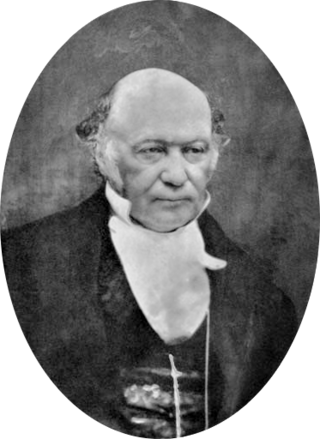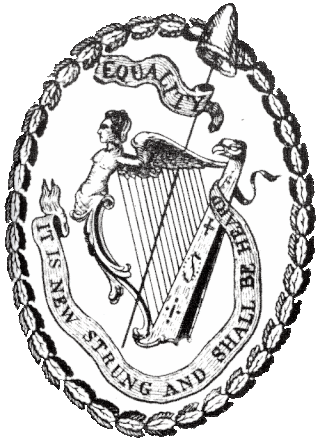This article needs additional citations for verification .(May 2017) |
Clondavaddog is a parish in the Diocese of Raphoe. Clondavaddog is situated at the northern part of the Fanad peninsula in County Donegal in Ulster, Ireland.
This article needs additional citations for verification .(May 2017) |
Clondavaddog is a parish in the Diocese of Raphoe. Clondavaddog is situated at the northern part of the Fanad peninsula in County Donegal in Ulster, Ireland.
The most relevant event in Irish history to have happened locally was the killing of the pro-British local Protestant minister, The Rev. William Hamilton, in March 1797, by an angry mob. This was one of several precursors to the Irish Rebellion of 1798. [1]

Sir William Rowan Hamilton LL.D, DCL, MRIA, FRAS was an Irish mathematician, astronomer, and physicist. He was the Andrews Professor of Astronomy at Trinity College Dublin, and Royal Astronomer of Ireland, living at Dunsink Observatory.
William Hamilton may refer to:

Earl of Roden is a title in the Peerage of Ireland. It was created in 1771 for Robert Jocelyn, 2nd Viscount Jocelyn. This branch of the Jocelyn family descends from the 1st Viscount, prominent Irish lawyer and politician Robert Jocelyn, the son of Thomas Jocelyn, third son of Sir Robert Jocelyn, 1st Baronet, of Hyde Hall. He notably served as the Lord Chancellor of Ireland from 1739 to 1756. In 1743, he was raised to the Peerage of Ireland as Baron Newport, of Newport, and in 1755 he was further honoured, when he was made Viscount Jocelyn, also in the Peerage of Ireland. He was succeeded by his son, the second Viscount. He represented Old Leighlin in the Irish House of Commons and served as Auditor-General of Ireland. In 1770 he also succeeded his first cousin once removed as fifth Baronet of Hyde Hall. In 1771 he was created Earl of Roden, of High Roding in the County of Tipperary, in the Peerage of Ireland. Lord Roden married Lady Anne Hamilton, daughter of James Hamilton, 1st Earl of Clanbrassil and sister of James Hamilton, 2nd Earl of Clanbrassil, a title which became extinct in 1798.

The Society of United Irishmen was a sworn association in the Kingdom of Ireland formed in the wake of the French Revolution to secure "an equal representation of all the people" in a national government. Despairing of constitutional reform, in 1798 the United Irishmen instigated a republican insurrection in defiance of British Crown forces and of Irish sectarian division. Their suppression was a prelude to the abolition of the Protestant Ascendancy Parliament in Dublin and to Ireland's incorporation in a United Kingdom with Great Britain. An attempt to revive the movement and renew the insurrection following the Acts of Union was defeated in 1803.
Henry Burton Conyngham, 1st Marquess Conyngham,, known as The Lord Conyngham between 1787 and 1789, as The Viscount Conyngham between 1789 and 1797 and as The Earl Conyngham between 1797 and 1815, was an Anglo-Irish courtier and politician of the Regency period. He served as Lord Steward between 1821 and 1830.
Maria Reynolds was the wife of James Reynolds, and was Alexander Hamilton's mistress between 1791 and 1792. She became the object of much scrutiny after the release of the Reynolds Pamphlet and central in America's first political sex scandal.

Killead is a hamlet and civil parish in County Antrim, Northern Ireland. It is near Aldergrove and Antrim and is accessed from the A26 Tully Road. It had a population of 81 people in the 2011 Census.
William McMillan was a lawyer, Judge, County Commissioner, and Delegate to the 6th United States Congress from the Northwest Territory. He was among the first settlers of what would become Cincinnati, Ohio.
The Honourable George Hamilton was a British politician, the second son of James Hamilton, 6th Earl of Abercorn.
Events from the year 1863 in Ireland.

Mount Jerome Cemetery & Crematorium is situated in Harold's Cross on the south side of Dublin, Ireland. Since its foundation in 1836, it has witnessed over 300,000 burials. Originally an exclusively Protestant cemetery, Roman Catholics have also been buried there since the 1920s.
Events from the year 1712 in Ireland.
Robert Jocelyn, 2nd Earl of Roden KP, PC (Ire) was an Irish peer, soldier and politician. He was styled The Honourable from his birth to 1771, and then Viscount Jocelyn from 1771 to 1797. He was the eldest son of the 1st Earl of Roden and Lady Anne Hamilton, daughter of James Hamilton, 1st Earl of Clanbrassil.
Jamestown was a constituency represented in the Irish House of Commons until 1800. It took its name from Jamestown, County Leitrim.

William Hamilton Drummond, D.D. was an Irish poet, animal rights writer and controversialist.
James Archibald Hamilton (1748–1815) FRIA, Irish cleric and astronomer, was born in the area of Athlone, Co. Westmeath, Ireland.

Baronscourt, Barons-Court or Baronscourt Castle is a Georgian country house and estate 4.5 km southwest of Newtownstewart in County Tyrone, Northern Ireland, and is the seat of the Duke of Abercorn. It is a Grade A-listed building.
The Rev. William Hamilton, FRSE, MRIA, FSAS (1755–1797), was an Irish Protestant minister, geologist, meteorologist and antiquarian, killed by a mob for his pro-British views. His book, Letters Concerning the North Coast of Antrim, was pivotal in the vulcanist understanding of the history of the planet and was translated into several languages.
John Walker (1769–1833) was a Church of Ireland cleric and academic of evangelical and Calvinist views. He seceded, as founder of a sect calling itself the Church of God, sometimes known as the Walkerites.